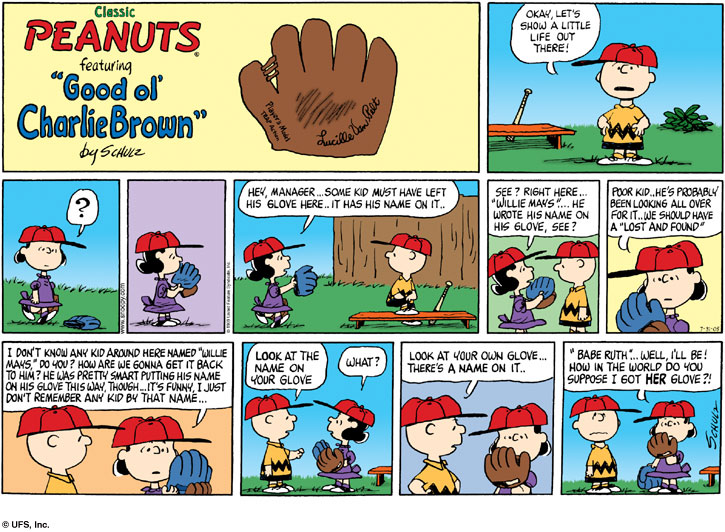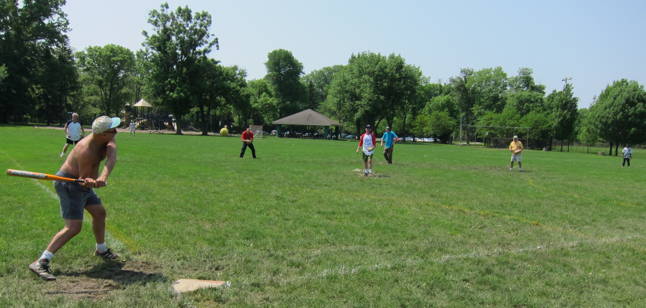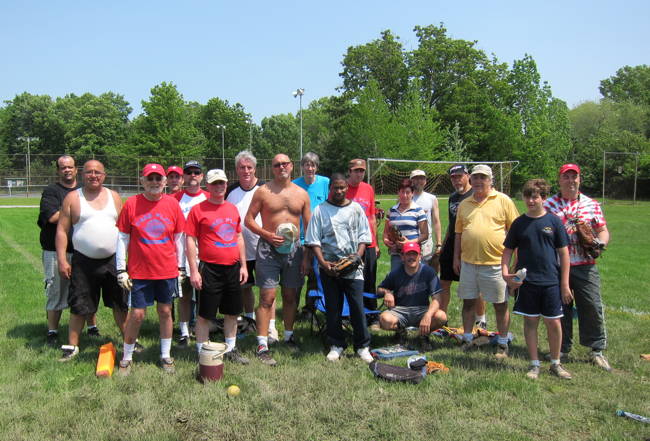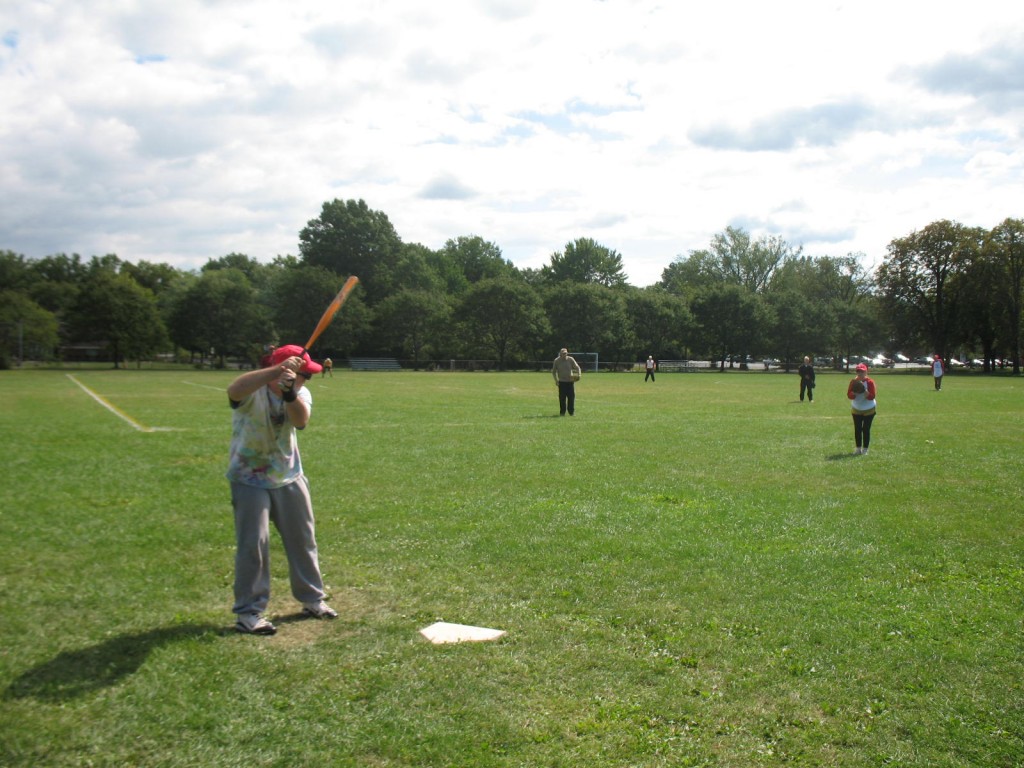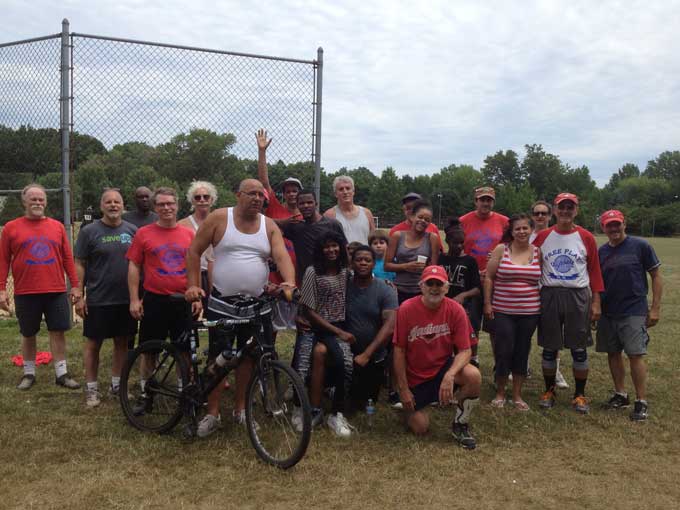
I spoke to the gang about arriving at the field on time. Offering how it would be neat to commence play close to the traditional ten o’clock time.
How about arriving in a timely fashion, or, agreeing to complete seven innings and go past the traditional noon ending time?
Could we collectively reclaim the principle of playing a full game? Is this year’s collective attenuation of the traditional ten-to-noon time slot a problem?
The Freeplay Sunday Softball league remains an experimental design in practice. The Drs. Kolb have theorized the game mightily, while I have only partially theorized it. And, different than the Kolb’s emphasis on the game-as-learning-space, I’ve had to approach it in terms of its explicit pragmatics, and approach it also as the alignment of these (to a degree) within the concrete action space–out of which game play is evoked every Sunday. It would be accurate also then to state I’ve had to approach it as a once-a-week problem of repeatable organizational development.
My conscious role is to capture the projective identification collectively commensurate with having the minimum authority to assist the initiation of the game. This is an obtuse way to describe the flow of leadership features being pushed upon me and pulled away from me, ending up predictably as enough of a leader to help instantiate the game. This role is connected to predicates, and the most substantial four are: the equipment is stored in the trunk of may car; I make out the line-ups and have done so for nine years; I voice the necessary commands to shift the players to the next step of the initiation of the game; and, I am a willing and sticky enough egoic character with respect to those aforementioned projections.
I was away from the game for four weeks and the requisite authorities were recreated and put upon replacement characters, and this was accomplished without fuss.
After I communicated my entreaty about arriving on time or playing seven innings, a miniature discussion ensued. Several persons stated the noon ending time would remain their ruling assumption; one person stated there wasn’t a problem anyway; two people reminded that we often play six or seven innings in less than ninety minutes. I ended by reminding the entire group that “I could do in the future the experiment of starting on time with whomever was here.”
Whatever.
One player came up to me and suggested, “You’re the boss so you can do what you want.”
Well, yes to a degree, and, ‘no’ to a much greater degree.
I understand my temporary authority has to most rigorously attend to the minimal set of verities. I am one of the principal stewards of those verities. They are marvelously concrete too. The essential one reflects the truth of: commencing the first pitch, batter, play of the game!
After the first pitch, under normal circumstances, my authority fades away, having fulfilled the slim portfolio of duties.
Interestingly, this is given by my privileged perspective–after all, I am one of only a tiny group of participants who have implemented an intentional [1] third order [2] viewpoint; am one of the few who reflect on the game and step back from it and theoreticize about it.
I’m not the boss. Theoretically, my role can be described as mediating the practical Object Relations within the holding field of the game’s ritual space. This way of putting it captures theoretical concerns. What then could be told of the practical way projection works in the matter of holding group concerns together so that group objectives may be predictably achieved every Sunday? It’s OD.
The actual phenomena is much more complicated. None of our group wants me to disrupt the internalized flow of predictable anticipation to bring to their attention a problem of so-called organizational development. The status quo is partly primitive. Don’t bother ‘it!’
Oh, what’s he on [us] about now?
Actually, I go into this, knowing I am in a better position, as against the group, to voice my individual concerns. Nobody had come up to me to ask me to advocate for more group sensitivity to the game’s temporal parameters. My prior experience has been that we may complete seven, eight, nine or more innings of free play softball should we commence the game around ten o’clock. My own view is that more play is better than less play.
However, here is the gist of our case of organizational development: whatever I deem optimal for myself is just so, for myself. Although I could approach this soft need as a group problem–and I did so–what I found out was that it wasn’t a group problem at all. I didn’t smoke out any alignment [3] with my concern at all.
[1] implication of intentional is a determined, directed, effort, rather than the more informal ‘folk-psychological’ and tacit efforts presumptively deployed by players in directing their own efforts to make operative sense of the softball activity when experienced as a meeting of different other minds, so-to-speak
[2] selecting apt analytic/interpretive frames (3rd order) having reflective experience of (2nd order) direct experience (1st order)
[3] a minimus link: given by supposing any need to use organizational development for the sake of obtaining new optimal goals do require maximal linkages.
Learning to Play, Playing to Learn: A Case Study of a Ludic Learning Space, Alice and David Kolb, The Journal of Organizational Change Management (2010)[pdf]
